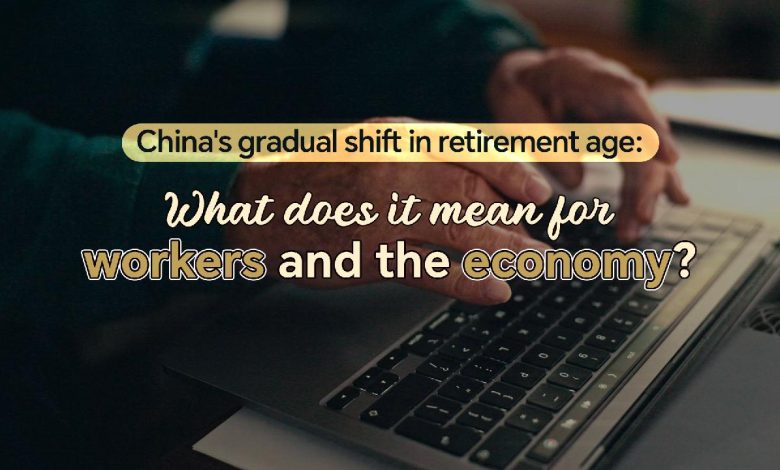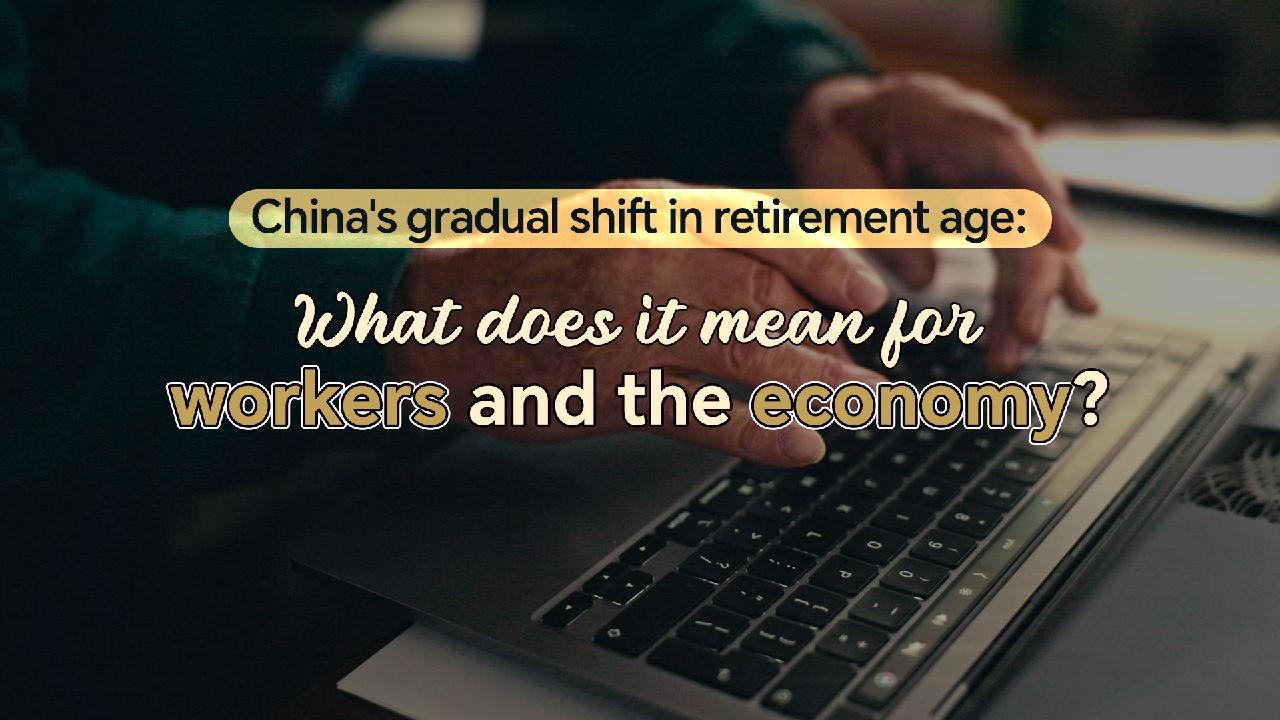China to gradually raise retirement age amid demographic changes

[ad_1]

<img src='https://news.cgtn.com/news/2024-08-09/China-to-gradually-raise-retirement-age-amid-demographic-changes-1vVsIzwwS6k/img/2fe2fec409ab494bb5bd15b8133a8686/2fe2fec409ab494bb5bd15b8133a8686.jpeg' alt=''
China plans to gradually raise the statutory retirement age, following a principle of voluntary participation with flexibility. This adjustment reflects a broader shift in the country’s retirement policy and aligns with a global trend of nations adapting to demographic shifts and changing workforce demands.
The decision addresses growing concerns about China’s aging population and the need for sustainable social security solutions. In response to similar demographic challenges faced by other countries, this adjustment aims to manage the domestic situation while aligning with international practices.
“The core purpose of the retirement system is to safeguard workers’ rights to rest once they exit the workforce, said Professor Song Jian from the School of Population and Health at Renmin University of China, who serves as the deputy director of the Population Development Studies Center. “This system is intricately linked with the labor market, employment practices, social security provisions and pension benefits.”
Historical context and global comparisons
The concept of retirement as a formal system began in Germany in the late 19th century under Chancellor Otto von Bismarck. In 1889, Germany introduced the world’s first state pension scheme, offering financial support to retirees aged 70 and older. This system set a precedent that influenced retirement policies worldwide.
Today, developed countries generally set the retirement age at 65 or 67, though actual retirement practices can vary. For instance, the U.S. sets its retirement age at 67 for those born in 1960 or later, with early claims resulting in reduced benefits and delayed claims offering increased benefits. Japan plans to raise its retirement age to 70, requiring at least 10 years of contributions and offering adjusted benefits for early or postponed retirements. Germany’s retirement age is set to gradually increase to 67 by 2031, with additional benefits provided through company and private pensions.
“Lowering the retirement age and increasing pension benefits have long been important concerns for workers worldwide,” Song told CGTN. “Since the 1980s, as population aging has intensified, many governments have responded by raising the retirement age to alleviate financial pressure on pension systems.”
China’s retirement policy, established after the founding of the People’s Republic of China, currently sets retirement ages at 60 for men, 55 for women in administrative roles, and 50 for women in labor-intensive jobs.
“The modern retirement system in China was established after the founding of the People’s Republic of China. While it has undergone various adjustments and reforms, the statutory retirement age has changed very little,” said Song. “As population aging intensifies and pension financial pressures mount, there is a growing need for further reform in the retirement system.”
<img src='https://news.cgtn.com/news/2024-08-09/China-to-gradually-raise-retirement-age-amid-demographic-changes-1vVsIzwwS6k/img/d0c10af629d6422187fb537fe50bdab3/d0c10af629d6422187fb537fe50bdab3.jpeg' alt='A senior offers free hard-pen calligraphy lessons to students on the streets of Handan City, north China's Hebei Province, September 6, 2023. /CFP'
Behind the policy shift
China’s retirement system has been adjusted to align with social and economic developments, as well as demographic changes. The country’s recent move to consider delaying the statutory retirement age is in line with global trends, said Song.
She noted that retirement ages have followed a “spoon-shaped” curve globally: initially high, then reduced, and now rising again. Many countries have adopted flexible retirement options, allowing workers to choose their retirement age and encouraging later retirement.
“In China, life expectancy has nearly doubled since the 1950s, making longevity a norm. The pressures of population aging are growing,” added Song, also the deputy secretary general of the China Population Association.
“Also, as higher education becomes more common, the entry age into the workforce is delayed, shortening workers’ actual working years. These demographic shifts are increasing pressure on both the labor market and the pension system.”
Once implemented, gradually raising the statutory retirement age will affect both labor supply and demand. On the supply side, it may help address labor shortages caused by a declining working-age population and maximize the potential of the workforce, according to Song. On the demand side, the varying willingness to delay retirement among workers and differing needs for labor quality and quantity across positions will influence the flexibility of extending working years.
<img src='https://news.cgtn.com/news/2024-08-09/China-to-gradually-raise-retirement-age-amid-demographic-changes-1vVsIzwwS6k/img/0b201217fc5642a4885cdb4d0d66285d/0b201217fc5642a4885cdb4d0d66285d.jpeg' alt='Members of an orchestra perform with their instruments at a park in Nanchang City, east China's Jiangxi Province, May 9, 2024. /CFP
'
Public reactions and challenges
China’s proposed retirement age adjustment has sparked considerable debate. On Xiaohongshu, a popular Chinese social e-commerce platform, the keyword “delay retirement” has garnered over 30,000 posts.
“I think many young people are concerned about increased financial burdens, job market pressures and the impact on work-life balance,” said Xiao Yu, a 32-year-old consultant.
“They worry that extending the working years might limit their job opportunities and strain their health, while also questioning the fairness and sustainability of the pension system.”
There are also concerns that delaying retirement could disproportionately benefit older generations at the expense of younger workers, exacerbating economic uncertainties and personal challenges.
Some young people tease “delayed retirement” online to draw attention to issues like job scarcity and high work pressure, said Song, adding that these employment challenges often result from structural imbalances, where some jobs remain unfilled while others are hard to find.
This issue relates to career expectations and job requirements, requiring collaboration between education and labor departments. She also noted that high work pressure is a widespread issue, calling for a shift in social mentality and improvements in the employment environment.
Addressing key concerns
Song highlighted several public concerns, include potential impact on job opportunities for younger people and possible conflicts between older workers’ employment and family responsibilities, such as childcare. There are also questions about the economic pressures on the retirement system and how delaying retirement might affect individual incomes and income inequality.
In response to these concerns, Song stressed the need to update the legal system to align the statutory retirement age with current conditions, and to gradually implement delayed retirement options for different groups based on the principle of voluntary flexibility. She also advocates for adapting job roles to better accommodate older workers.
“Strengthening family support through a universal childcare service system could help address childcare concerns,” said Song. “And ensuring a consistent pension system across both urban and rural areas and among different professions is crucial for providing adequate retirement benefits for everyone.”
(Cover image designed by Liu Shaozhen)
[ad_2]
Source link





